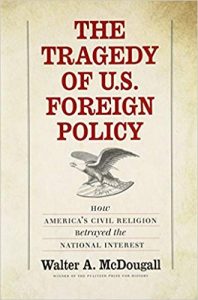The book “The Tragedy of US Foreign Policy How America’s Civil Religion Betrayed the National Interest” is written by Walter A. McDougall. McDougall is the Professor of History and International Relations at the University of Pennsylvania. He has authored numerous books, including the famous 1986 Pulitzer Prize winner “The Heaven and the Earth: A Political History of the Space Age.” The book offers an insight into America’s confined role in domestic politics and journey towards the status of global power. The book is a useful read up for those interested in history, American politics and the future world order.
Being a political actor, the US has performed actively in world theatres, while at times the country’s focus revolved around domestic issues with a minimal foreign role (Traditional Realists perspective). While seeing the US from the prism of Structural Realists, the country has endeavoured to grow and counterbalance opposing forces globally (p. 17). American political standing coupled with the economic prowess altered the country’s outward approach. “You cannot talk about American security without talking Europe, the Middle East, the freedom and security of the sea lanes, and the hundreds of millions of underfed, frustrated human beings throughout the world” (reference – Secretary of the Navy James Forrestal, 1947) – p. 239. The American people tried to look beyond the domestic lens with an aim to project their power to other regions of the world. In this regard, political and religious forces have guided the US foreign policy contours. The author has highlighted this point and has referred to the statement of Senator Albert Beveridge: “God had given Americans a noble land with a glorious future, the march of the America flag around the world was the fulfillment of God’s purpose; if we were God’s chosen people, then we could not fly from our duties, which included our benevolent rule over childlike colonial peoples. Indeed, the US dared not retreat from any soil where Providence has unfurled our banner … for liberty and civilization are God’s promises fulfilled, the flag henceforth be the symbol and the sign to all mankind” (p. 122). The Cold War was fought against the Communism; “God must be calling Americans to shelter and succor all peoples threatened by at heistic communism” (p. 239). The US fight against communism, as a threat to democratic principles, reinforced the idea of collective security. The US and its ally states in the advancement of their politico-religious values undertook industrial programmes in developing countries. The states alongside the US during the US-Soviet bipolar world might have been the recipient of the US aid and weaponry. Meanwhile, once the Cold War ended, the ally states also bore the brunt of the war fought in Afghanistan, in particular, the neighbouring countries faced the maximum fall outs.
As per the US perspective, Washington’s role in world politics has benefited humanity and upheld the principles of civilization. The Arlington National Cemetery built in the aftermath of the Philippine War, signifies the American bravery against “savagery and barbarism.” Further, it has been argued that the losses, sufferings and the sacrifices during the war had left deep scars on the Filipinos. In the words of Philippine nationalists Manuel Quezon: “I would prefer a government run like hell by Filipinos to one run like heaven by Americans” (pp. 127 & 129). The sentiment of the Filipinos can be seen in the Afghan war, where the locals see the US and coalition troops as an occupational force. In reaction, the locals have supported the Taliban, a major reason why the US and Kabul government have failed to win over the masses and establish control over the country.
The US had also exploited the humanitarian cause to intervene in failing states. One such example is the intervention in Venezuela; the American police was employed to deter the Europeans from entering the country. The US peace deal with Japan (Treaty of Portsmouth-1905), to muster Japan’s regional support, simultaneously, the US engineered to engage the Far Eastern countries for trade purposes refers pragmatism in foreign policy (p. 136). The post 9/11 period saw American military interventions in Afghanistan and Iraq. The dictum “Either you are with us, or you are with the Terrorists” (p. 8), strategized the world opinion. Iraq was attacked on the pretext of Weapons of Mass Destruction (WMD), which “soon turn out to be imaginary; however, to justify the intervention, the “Bush administration turned the tide into moral gear.” The author further states that the US endeavour to rebuild Iraq and strengthen democratic values failed, instead, the “US default mission in Iraq” led to chaos; and the power vacuum provoked extremist tendencies (pp. 11, 12). In Afghanistan, a political government was setup; in addition, a number of international agencies for human rights started working. Despite, these political moves, the outcome was perpetual disarray and instability. Moreover, the Kabul government’s incompetence led to governance issues (pp. 13, 14). The wars in Afghanistan and Iraq had been a subject of debate among scholars, practitioners and policy makers. Seeing the prevalent situation in Afghanistan and Iraq, the wars have failed to achieve peace. The situation in both the countries over the years has become much more complex, new actors are at play, thus, intensifying the security challenge. Keeping in view, the US presence in Afghanistan, near to China, and next door to Central Asia, and Russia, the policy options required to amicably address the terrorist threat should be multifarious, with other regional stakeholders on board and with constant nudge for cooperation; this will open up prospects for peace.
Reviewed by Amna Ejaz Rafi, researcher at Islamabad Policy Research Institute (IPRI)
{A version appeared in Daily Times dated March 29, 2019}


